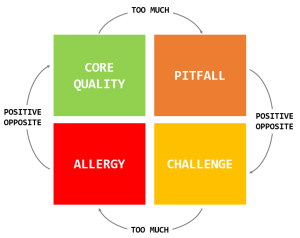When I teach improvisation some people fear that they will be seen as not-serious. Usually this is the fear of the most serious (or stiff) participants. They are afraid that if they embrace the improv principles they will look too childish or reckless. But what happens is that they think about those abilities pushed too far.
Daniel Ofman has a theory that puts this into a model.
- We all have some good qualities (Ofman refers to a core quality – a quality that was not acquired). Let’s say you’re a good communicator – you are good at putting your thoughts in spoken words, you make yourself easily understood by other people, you have a good vocabulary.
- But any good quality can turn into a pitfall if you have too much of it. Let’s say you talk to much – you over explain things, in a conversation all you do is talk and not listen at all.
- So that might become a weakness and you want to work on it. So you’ll start training your listening skills – which, of course, it’s a challenge since it doesn’t come as natural.
- If you over do it, if you start to listen too much, you might stop telling what’s on your mind and you don’t use your good communication skills after all. Ofman calls this an allergy. Usually people don’t want to become the extreme opposite of what they are, they don’t envy people who are at the opposite extreme of a quality they poses – we probably wouldn’t see it as a quality if we did.
The participants I talked about at the beginning have an allergy for an opposite trait. They believe that if they train their playfulness, humor, being in the moment and saying YES they’ll become something they don’t like. But that’s not the case. Nobody says you have to go to an extreme – it’s all about balance. It’s about stretching yourself just enough to become an even better version of who you are, to become more adaptable.
I think it happens awful lot of times that we refuse to develop ourselves out of the fear of becoming a person we dislike. But stretching yourself in a different direction than you are used to doesn’t mean you’ll fall on the other side – it’s all in the balance. A little bit of what you think it’s bad if it’s too much might have a great impact on what you already have.
Can you identify your allergies?


Leave a Reply